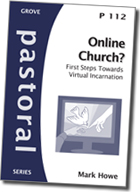 |
||||||||||
 |
||||||||||
|
Seize the Net Mark Howe, one of the driving forces behind St Pixels, the online church which started out as our very own Church of Fools, asks why Christians have been so slow to see the amazing opportunities offered by online community and virtual church. Mark's book, Online Church? has just been published. If Gandhi had spoken of the church's response to innovation, he might have said: "First they ignore it, then they laugh at it, then they demonise it, then they lose." Too often, it seems that God requires the faithful to adopt the same technology as everyone else, but a decade too late: black and white TV in the home when everyone else is watching in colour; faxes in the church office when everyone else is embracing email; email in the presbytery while half the congregation is running around World of Warcraft with seven green legs apiece. The Internet is especially evil, apparently, because it strikes at the heart of society. Our entire lives will soon be spent surfing for porn and poker. Skin will grow over our eyes, physical contact will cease, procreation will become a forgotten art and extinction will inevitably follow. I'm exaggerating, but not by much. In his book, Habits of the High-tech Heart (subtitle: "living virtuously in the information age"), Quentin Schultze of Calvin College declares that "If we live too fully in accelerating cyberspace, we become high-tech nomads, lost in non-intimate existence, deprived of the potential virtues cultivated primarily within proximate community." We should understand cyberspace through "the metaphor of the libertine web surfer, a selfish bandit grabbing all the digital gusto he or she can." Whatever digital gusto is, there is a direct link between how much of it you have and the speed of your router: "Restricting bandwidth is a moral task," declares Schultze. So blessed are the dial-up users, for their patience shall be rewarded. Neophobia is nothing new. Two hundred years ago, Benjamin Franklin was already bemoaning the decline of community, lack of digital gusto notwithstanding. The automobile, telegraph, telephone, radio, cinema and – especially – television were all supposed to send community into terminal decline. You might expect community to be subterranean by now, but the self-evident reality is that community continues, albeit in changing ways. And of course technology is fine as long as it is obsolete. Schultze mocks his contemporaries for believing in "a promising high-tech future, not an old-fashioned mechanical past". What he seems to have forgotten is that the Industrial Revolution was once the high-tech future that was responsible for arguably the most rapid change in global society in human history. Almost as disastrous in the long term as the "here be dragons" approach advocated by Schultze is the tendency to view new technology as a slightly better version of old technology. Email becomes a way to send a letter without having to lick a stamp, and websites are a way to publish huge screeds of Calvinesque text without the irritation of proof readers. Of course, it is perfectly possible to use the Internet this way, but doing so can create a false impression that nothing has really changed, and thus postpone the need for a radical response. Much Christian reaction to the Internet is quite superficial, and, predictably, obsessed with sex. Yes, there's unsavoury content on the web, but a previous generation found their unsavoury content by mail order or in their corner shop, and Corinthian debauchery didn't seem to be hampered by a lack of peer-to-peer networking. The most important issues are more than skin(tone) deep. You can't baptise the Internet as Christian by using a family filter and posting second-rate dove clipart everywhere. So what are the current trends in technology and the way people are using the Net, which ought to make the church sit up and take notice? User-generated content is one important trend. We'll continue to use the Internet to download everything from music to live television, but creating and distributing our own content is far more subversive. From blogs to YouTube via eBay, Internet usage is increasingly about contributing from within a community of contributors. That seems like a healthy trend, and one that the gospel ought to be able to embrace, but traditional models of church are too often geared to a broadcast-type hierarchical model, with the pulpit acting as the antenna. When even the BBC – once the quintessential "mother knows best" media outlet – is posting videos on YouTube and allowing user-generate content across its entire website, it must be time for the church to rethink its model of communication at the most basic level. There is also a concerted move towards "joined-up technology". RSS – a system that lets websites and users share information feeds – is one of the simpler examples. There are schemes to make online identities portable across sites, to allow websites to search for photos on Flickr, and to pick up maps, aerial photos and almost anything else from Google. In that "share everything" culture, Christian websites are in serious danger of looking like ghettos, behaving as if theirs is the only site on the Net. A third trend is towards mobile Internet. After a few abortive attempts (WAP really was crap), products such as the iPhone and increasing 3G coverage signal the arrival of mainstream Internet access from almost anywhere. The first hurdle for most Christians is simply that they have already passed the age at which it is possible to understand a mobile phone. Beyond that, what do churches have to offer that anyone would want to view at a bus stop? The question sounds absurd, but the church claims to follow a man with a proven ability to stop traffic. Developments in Internet culture are a challenge to conventional ways of doing church. But, if we got our act together, maybe we could do some challenging of our own. The future of social networking is still up for grabs. The church is probably still the largest volunteer organisation in the world, and it really should have something to say about positive ways of building community. That's why I was excited about online church when Church of Fools was launched in 2004, and why I'm excited by the way St Pixels has developed from that project. It's also why we need more online churches, and more diversity among those online churches. We need to incarnate the gospel in a broad and ever-changing online culture, and no one church or organisation can expect to keep up with every aspect of that culture. Watch this space in the coming months for our own attempt to make online church planting a little easier. Mark Howe's new book, Online Church? First steps towards virtual incarnation, can be ordered here. |
|
|
|||||||||||||||||||||||||||
 |
||||||||||||||||||||||||||||||





